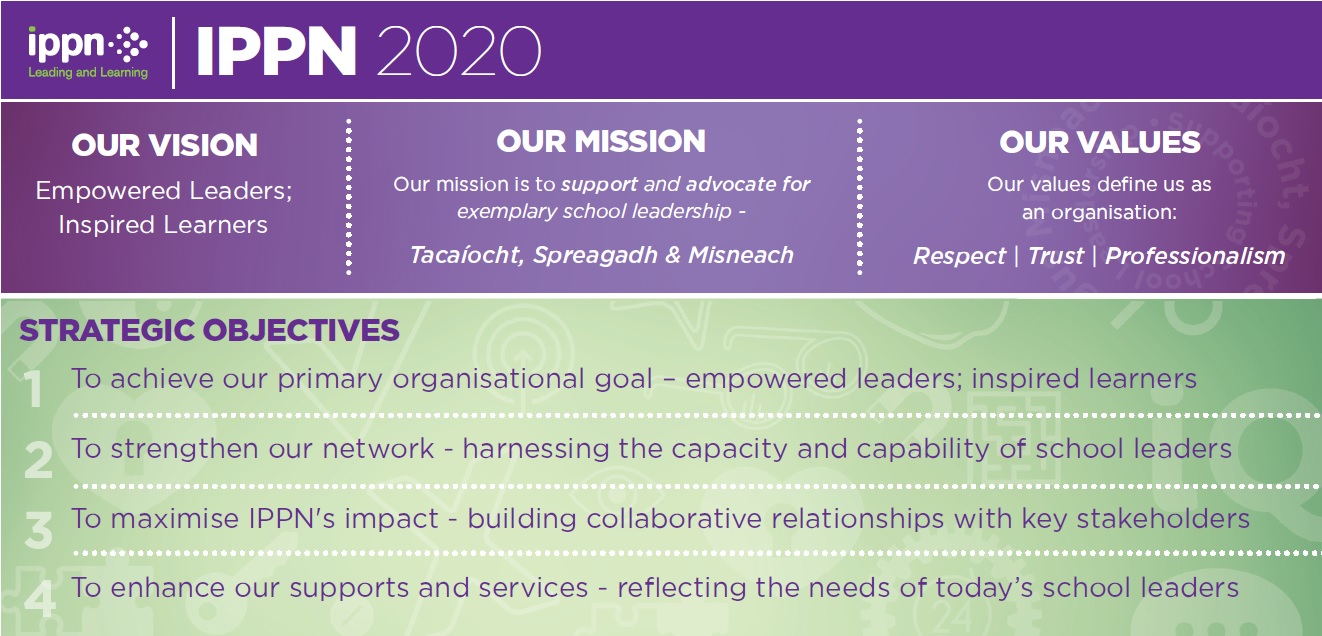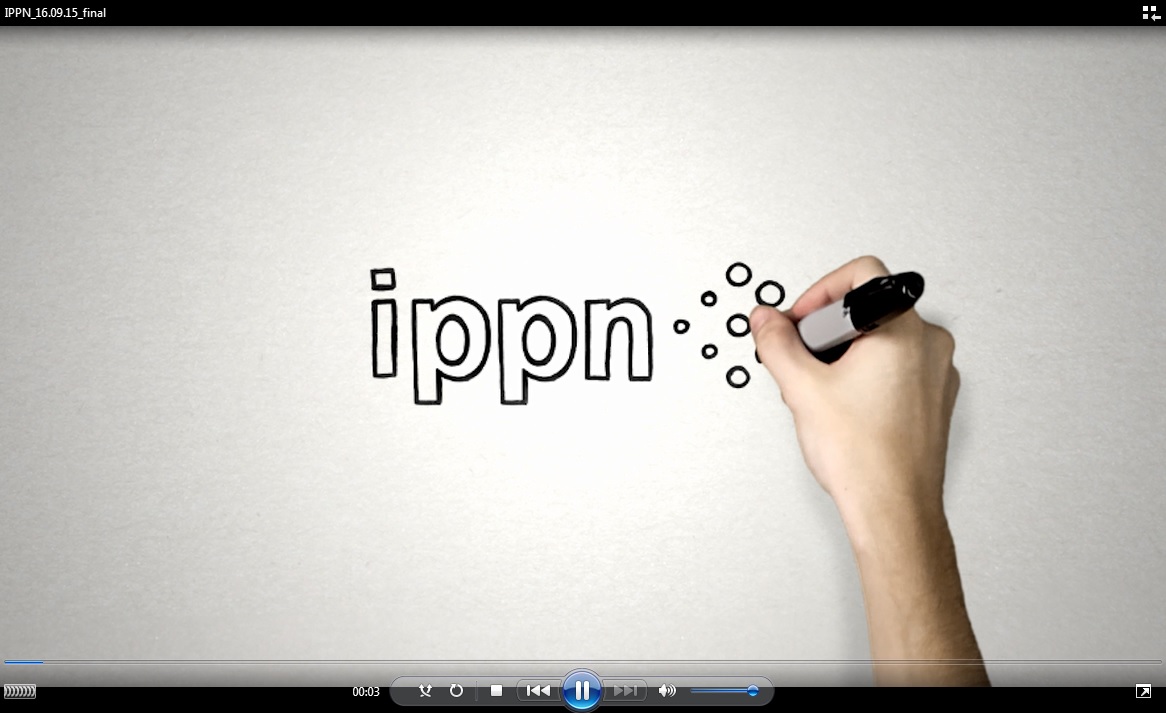IPPN Firsts
- Published: 02 March 2016
- The first informal meeting of what would become the Interim National Committee took place in Kildare Education Centre on 19th March 1999.
- The first people to take up National/ Executive Committee Roles
- The first IPPN staff member - Sue Cowburn, confirmed at IEC 29th June 2001.
- The first full-time Director, Seán Cottrell, seconded from Glounthaune NS, Co. Cork from 2000.
- The first official IPPN paid membership was submitted by the late Moira Lynch, Principal of St Manchan’s NS, Tubber, Co. Westmeath.
- The first National Executive Meeting was held on 31st May 2001 in the Ormond Hotel, Dublin.
- The first IPPN County Network meeting took place in Monaghan on 18th September 2000.
- The first IPPN Principals’ Conference was held between 15th and 17th Feb 2001, at the Corrib Great Southern Hotel, Galway.
- The first Education Expo was at the Citywest Hotel during Conference 2004.
- The first membership fee was £75 for the academic year 2001/2002.
- The first associate memberships were offered to retired Principals, academics and educational institutions in 2003.
- The first Deputy Principals’ meeting was held on 19th Oct 2002 at the Heritage Hotel, Portlaoise. Among topics discussed were the role of the DP and how IPPN could help DPs in their role.
- The first DPs’ Professional Development Seminar - ‘Deputy Principals - Looking to the Future’ – was held on 30th May 2003 at the Corrib Great Southern Hotel, Galway. The seminar was attended by 65 DPs.
- The first IPPN press release was issued on 15th February 2001 - ‘Crisis Looms as 67% of Teachers Spurn School Principal Position’, by Tomás Ó Slatara PRO and Seán Cottrell, Director.
- The first media interview was on 16th February 2001, during the first IPPN Conference - SeánCottrell interviewed by David Hanley on Morning Ireland on the topic of the challenges of school leadership.
- The first IPPN newsletter was sent to schools in March 2000. This was edited by Tomás Ó Slatara and printed by retired Principal Liam Stapleton of Lion Print, Cashel.
- The first mailing list for Principals - networking@ippn.ie was initiated in October 2000 with 250 Principals participating.
- The first mentors identified to support newly-appointed Principals in September 2002.
- The first edition of PIMS Desk Diary was sent to all schools in June 2006.
- The first IPPN Bursary – a Study Visit to New Zealand sponsored by AIB - was awarded to Helen O’Sullivan and Marie Dunphy in July 2004.
- The first sod was turned for IPPN’s permanent Support Office on Friday, 26th June 2009 by founding President Jim Hayes.
- Website for recruitment in schools - EducationPosts.ie - was launched 1st July 2002 at St. Patrick’s College, Drumcondra.
- TextaParent.ie was established in October 2004 - attracted much media attention including Sky News!
- DES Circular 14/2002 advised Boards of Management that IPPN’s membership fee was an allowable Board expense.
- DES conferred ‘Designated Status’ to IPPN – recognising IPPN as an official Education Partner with corresponding consultation rights - Conference 2007.
- First international links – Colm Cregan and Tomás Ó Slatara attended bi-annual World Convention of the International Confederation of Principals (ICP) in Korea, July 2001.
- First North/South links – meeting with the National Association of Head Teachers (NI) in Belfast in 2001.
- First Irish Principal elected to the Executive Committee of the ICP – Virginia O’Mahony, Scoil Chaitríona Senior, Galway in April 2006.
- First North/South Conference of Primary Principals was held in November 2004 in the Slieve Russell Hotel, Cavan.
- First invitation for an IPPN nominee to participate in a DES policy group - Pat Goff, to the National Consultative Forum of the NCSE in 2007.
- Tomás Ó Slatara & Paul Murphy were IPPN’s first representatives at NAHT Conference in Jersey 2000.
Gerard Ruane, IPPN Treasurer
- Published: 29 May 2014
 Gerard Ruane is originally from Co. Mayo and spent part of his childhood in Co. Leitrim. He attended Ballinamore National School, Co. Leitrim and Bonniconlon National School, Co. Mayo. Following his secondary education in St. Muredach's College, Ballina, Co. Mayo, he trained as a teacher in Mary Immaculate College. He holds a Diploma in Management from Trinity College, a Diploma in Special Education Resource Teaching from Froebel College and a Masters of Arts in Special Education Needs from Roehampton University, London.
Gerard Ruane is originally from Co. Mayo and spent part of his childhood in Co. Leitrim. He attended Ballinamore National School, Co. Leitrim and Bonniconlon National School, Co. Mayo. Following his secondary education in St. Muredach's College, Ballina, Co. Mayo, he trained as a teacher in Mary Immaculate College. He holds a Diploma in Management from Trinity College, a Diploma in Special Education Resource Teaching from Froebel College and a Masters of Arts in Special Education Needs from Roehampton University, London.
Gerard spent seven years teaching in St. Patrick's National School, Slane, Co. Meath, where he was also a post-holder. In 2007 he became Teaching Principal of Kilskyre National School outside Kells in Co. Meath. It initially had two mainstream teachers and a shared learning support teacher. Over the course of four years in grew to become a four teacher school with a shared learning support teacher. In 2011 he moved to Co. Clare and became Teaching Principal of Scariff National School. It had six mainstream teachers, a learning support teacher and a resource teacher. He became Administrative Principal of Parteen National School, Co. Clare in 2014. It had fourteen mainstream teachers, seven support teachers and five special needs assistants. In 2021, he moved to Barefield National School, which has fifteen mainstream teachers, seven support teachers (including one teacher of a special class for children with autism) and ten special needs assistants. He has an acute understanding of the challenges facing Principals of small and large schools.
He has facilitated the IPPN Summer Course, Ciall Ceannaithe, for a number of years. He delivered a seminar on Workload Management for Teaching Principals at conference. He is a member of the Leadership Support Panel and is a member of the Clare County Committee and the IPPN Board of Directors. Gerard was elected as IPPN Treasurer in June 2019. He is married to Aoibheann, who is also a primary school Principal, and has one son, Mícheál, and two daughters, Méabh and Aela.
Organisation Structure
- Published: 30 October 2012
IPPN consists of 3 different layers of organisation:
- Local Principals' Support Groups
- 26 County Networks - forming the National Council
- The National Council elects Directors, forming the Board of Directors.
Local Principals' Support Groups
Support Groups form the main 'cell structure' of IPPN. Principals' Support Groups have been in existence and sustained with the support of local Education Centres. Every Support Group has its own dynamic. The most common shared characteristics of successful support groups are:
- one member co-ordinates the date and venue of the next meeting
- one main topic selected by consensus as the focus of the next meeting
- each meeting used to discuss a variety of current issues
- regular monthly meetings e.g. second Thursday of the month
- meetings immediately after school or by night - some groups meet in the afternoons of administration days
- small groups - normally 8 to 12
- a high degree of confidentiality and discretion
- a regular social dimension
- frequent sharing of resources, ideas and strategies
- no formal agenda
- no minutes or reports
- no external speakers.
By definition, a Principals' Support Group does not include deputy principals as the main motivation of the group is to support those who are in the role of principal. Deputy principals who are acting up as principal can become a member of a Principals' Support Group. Other DPs can of course set up or become a member of Deputy Principals' Support Groups. There are some examples of such groups around the country.
County Networks
When a member joins IPPN, the location of the school determines the county network to which the principal/ deputy principal belongs. Each County Network will typically organise one professional development event per term, i.e. 3 per annum. These professional development events are funded through IPPN nationally and are open to all principals and deputy principals of member schools.
National Council and its Committees
Each member of the National Council:
• ensures effective two-way communication between the National Council and the City/County Networks and Local Support Groups
• represents the key professional issues, concerns and needs of the member’s City/County Network to the Board, National Council and its Committees and Working Groups
• assists the Board of Directors and National Council in developing IPPN policy
• attends the Annual General Meeting of the Company.
The 93 National Council representatives (3 from each of the 31 City/County Networks) serve on one of the three committees of the National Council:
1. Advocacy & Communications
This committee is involved in the advocacy work of IPPN, informing and shaping IPPN’s engagement on relevant issues with the education stakeholders.
2. Professional Development
This committee impacts and shapes the professional development opportunities that IPPN designs and delivers, ensuring that the CPD that members need and want, is provided.
3. E-services
This committee impacts and shapes the web services supports that IPPN offers to members, ensuring that those services do what members need them to do in terms of functionality and accessibility.
Click here for an online list of current National Council members by county.
In Autumn each year, each County Network will elect / nominate two members to act as its representatives to the National Council. Two Representatives from each of the 26 County Networks form a 52-person National Council. The IPPN National Council elects Directors at its AGM each year to manage the affairs of the organisation. These Directors are collectively referred to as theBoard of Directors.
Vision, Mission, Values
The importance of school leadership as an influence on, and key determinant of pupil learning, has been clearly established. The equation is simple – effective school leadership leads to school effectiveness, which in turn leads to better outcomes for children. It is, therefore, a priority that school leaders should be empowered and supported to deliver that effective leadership in our schools, thereby maintaining their focus on what is most closely aligned with their core purpose – leading teaching and learning.
IPPN aspires to empower school leaders to provide the most effective leadership of their school communities. We do so through the provision of supports and services that enable that empowerment, and through our advocacy for the enhancement of leadership capacity, effectiveness and sustainability. This work is shaped directly by our engagement with our members to ensure that it reflects their needs and perspectives. We also advocate with our fellow Education Partners in the best interests of children, schools and school leaders.
The way in which we work to achieve our stated objectives is underpinned by our values of respect, trust and professionalism, which define us as an organisation.
About IPPN
- Published: 30 October 2012
School Leadership
School Leadership is both professionally challenging and personally rewarding. The Irish Primary Principals' Network (IPPN) was established in the year 1999 to address principals' professional and personal needs.
IPPN’s focus from the beginning has been to support principal teachers at local and county level and to represent their views nationally.
Professional Body
IPPN is the officially-recognised professional body for the leaders of Irish primary schools. It is an independent, not-for-profit voluntary association with a local, regional and national presence. Recognised by the Minister for Education as an official Education Partner, IPPN works with the DES, the National Parents' Council, management bodies, unions, education agencies, academic institutions and children's charities towards the advancement of primary education. The Republic of Ireland has approximately 540,000 children attending 3,320 primary schools. IPPN articulates the collective knowledge and professional experience of 6,600 Principals and Deputy Principals. As a registered charity, IPPN complies with the requirements of the Charities Act 2009.
Structure
IPPN supports Principals at local and county level and represents their interests nationally. Principals and Deputy Principals participate in local support groups. IPPN facilitates twenty-six County Networks and each Network meets at least three times each year. Each County Network elects two members to form IPPN's National Council . The National Council is responsible for governance and policy. It elects a President and officers who form the Board of Directors.
IPPN works closely with the National Association of Principals and Deputy Principals (NAPD), the Ontario Principals' Council (OPC), and is a member of the International Confederation of Principals (ICP). These links play an important role in our research and pursuit of best international practice.
Click here for more information about IPPN
Click here to view a video highlighting IPPN's work on behalf of its members






















































